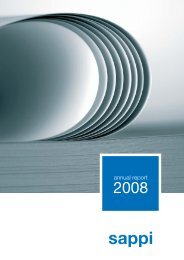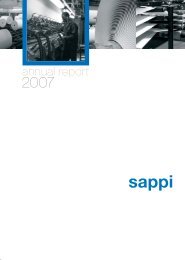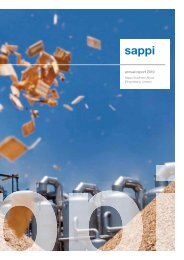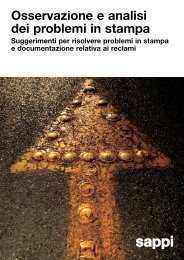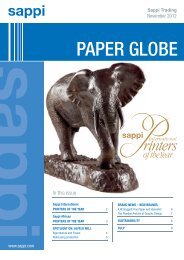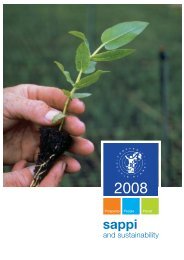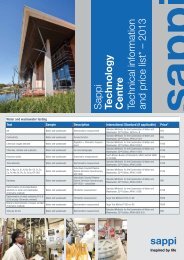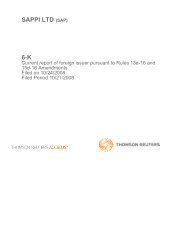2012 Integrated report - Sappi
2012 Integrated report - Sappi
2012 Integrated report - Sappi
Create successful ePaper yourself
Turn your PDF publications into a flip-book with our unique Google optimized e-Paper software.
encourage<br />
Audit committee<br />
The audit committee consists of five independent, non-executive<br />
directors and assists the board in discharging its duties relating<br />
to the:<br />
> safeguarding and efficient use of assets;<br />
> oversight of the risk management function;<br />
> operation of adequate systems and control processes;<br />
> reviewing financial information and the preparing of accurate<br />
financial <strong>report</strong>s in compliance with applicable regulations<br />
and accounting standards;<br />
> reviewing sustainability information included in the annual<br />
integrated <strong>report</strong>;<br />
> reviewing compliance with the group’s code of ethics and<br />
external regulatory requirements;<br />
> oversight of the external auditors’ qualifications, experience<br />
and performance;<br />
> oversight of the performance of the internal audit function;<br />
and<br />
> oversight of non-financial risks and controls, as well as<br />
IT governance, through a combined assurance model.<br />
The audit committee confirms that it has received and<br />
considered sufficient and relevant information to fulfil its duties,<br />
as set out in the audit committee <strong>report</strong> on page 100.<br />
The external and internal auditors attended audit committee<br />
meetings and had unrestricted access to the committee and its<br />
chairman. The external and internal auditors met privately with<br />
the audit committee during <strong>2012</strong>.<br />
Regional audit committees exist in the three major regions and<br />
are chaired by independent non-executive directors. These<br />
committees have a mandate from the group’s audit committee,<br />
to which they <strong>report</strong> on a regular basis. The regional committees<br />
each met four times during <strong>2012</strong>.<br />
Dr D Konar has been designated as the audit committee financial<br />
expert as required by the Sarbanes-Oxley Act of 2002, and<br />
attended the annual general meeting in <strong>2012</strong>.<br />
Nomination and governance committee<br />
The nomination and governance committee consists of four<br />
independent directors and considers the leadership requirements<br />
of the company including a succession plan for the board.<br />
The committee identifies and nominates suitable candidates<br />
for appointment to the board, for board and shareholders’<br />
approval. The committee considers the independence of<br />
candidates as well as directors. The committee makes<br />
recommendations on corporate governance practices and<br />
disclosures, and reviews compliance with corporate governance<br />
requirements. The committee has oversight of appraising the<br />
performance of the board and all the board committees. The<br />
results of this process and recommended improvements are<br />
communicated to the chairman of each committee and the<br />
board. Following the 2011 appraisal process which was<br />
conducted by an external evaluator, the <strong>2012</strong> performance<br />
assessments were conducted internally. As with the 2011<br />
process, the <strong>2012</strong> results indicated that the board and all the<br />
board committees functioned well and that there were no major<br />
shortcomings.<br />
Human resources and compensation<br />
committee<br />
The human resources and compensation committee consists<br />
of four independent directors. The responsibilities of the human<br />
resources and compensation committee are, among others,<br />
to determine the group’s human resource policy and strategy,<br />
assist with the hiring and setting of terms and conditions of<br />
employment of executives, the approval of retirement policies<br />
and succession planning for the CEO and management. The<br />
committee ensures that the compensation philosophy and<br />
practices of the group are aligned to its strategy and<br />
performance goals. It reviews and agrees the various<br />
compensation programmes, in particular the compensation of<br />
executive directors and senior executives as well as employee<br />
benefits. It also reviews and agrees executive proposals on<br />
the compensation of non-executive directors for approval by<br />
the board and ultimately by shareholders.<br />
Regional human resources and compensation committees meet<br />
on an ad-hoc basis to execute HR strategy and implement policy<br />
at a regional level.<br />
Social, ethics, transformation<br />
and sustainability committee<br />
The social, ethics, transformation and sustainability (SETS)<br />
committee comprises three independent non-executive directors,<br />
a non-executive director and the CEO. Other executive and group<br />
management committee members attend SETS committee<br />
meetings via invitation. Its mandate is to oversee the group’s<br />
sustainability strategies, ethics management, good corporate<br />
citizenship, labour and employment as well as its contribution to<br />
social and economic development and, with regards to the<br />
group’s South African subsidiaries, the strategic business priority<br />
transformation.<br />
Regional sustainability councils provide strategic and operational<br />
support to the SETS committee in dealing with day-to-day<br />
sustainability issues and helping to develop and entrench related<br />
initiatives in the business.<br />
For more information on sustainability at <strong>Sappi</strong> refer to<br />
pages 16 to 29 for a summary of the group’s initiatives and<br />
www.sappi.com.<br />
sappi <strong>Integrated</strong> Report <strong>2012</strong> 69



